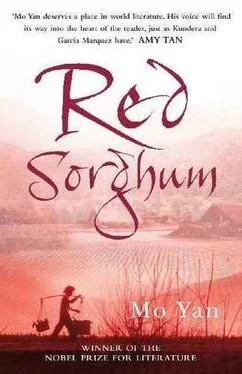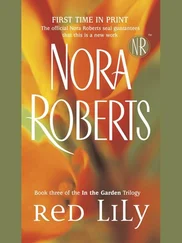‘What’s wrong?’ Granddad whispered.
‘I cut my hand, Dad,’ Father whispered back.
‘We can’t get through. Let’s go back!’
‘If we had our guns…’
‘We still couldn’t make it.’
‘We could shoot out the lights!’
They retreated into the shadows, where Granddad picked up a brick and threw it towards the tracks. One of the sentries shrieked in alarm and fired. The searchlight spun around and swept the area as a machine gun opened fire, the sound so loud that Father nearly went deaf. Sparks flew from bullets ricocheting off the tracks.
The fifteenth day of the eighth lunar month, the Mid-Autumn Festival, is one of the biggest market days in Gaomi County. The people still had to go on living, even though it was wartime. Business was business. The roads were filled with people at eight o’clock in the morning, when a young man named Gao Rong manned his post at the northern gate to search and question those entering and leaving town. He knew the Japanese soldier was watching him with ill-concealed disgust.
An old man in his fifties and a teenage boy were driving a goat out of town. The old man’s face was dark, his eyes steely; the boy’s face was red and he was sweating, as from a case of nerves.
‘Where are you going?’
‘Leaving town. Going home,’ the old man replied.
‘Not going to market?’
‘Already been. Bought this half-dead goat. Cheap.’
‘When did you come into town?’
‘Yesterday afternoon. We stayed with a relative. Bought the goat first thing this morning.’
‘Now where are you going?’
‘Leaving town. Going home.’
‘Okay, you can pass!’
The goat’s belly was so big it could barely walk. When Granddad whipped it with a broken-off sorghum stalk, it cried out in agony.
They stopped at the gravesite to retrieve their weapons.
‘Shall we let the goat go, Dad?’
‘No. Let’s take it with us. We’ll kill it when we get home, so we can celebrate the Mid-Autumn Festival.’
They arrived at the village entrance at noon, near the tall black-earth wall that had been repaired not many years before. A hail of gunfire erupted from the heart of the village and beyond, and Granddad immediately knew that what they’d been dreading had finally happened. He was reminded of the premonition he’d had for the past several days, and was glad he’d decided to go into town that morning. They’d fought the odds and accomplished their task; that was all anyone could ask of them.
Granddad and Father hurriedly picked up the half-dead goat and carried it into the sorghum field, where Father cut the hemp they’d used to sew up its rectum. They’d stuffed 550 bullets up the goat’s ass in that woman’s house, until its belly drooped like a crescent moon. During the trip back, Father had been worried that the bullets would split the goat’s belly or that the animal would somehow digest them.
As soon as the hemp was cut, the goat’s rectum opened up like a plum flower, and pellets came pouring out. After relieving itself violently, the goat crumpled to the ground. ‘Oh no, Dad!’ Father cried in alarm. ‘The bullets have turned into goat pellets.’
Granddad grabbed the goat by its horns and jerked it to its feet, then bounced it up and down. Shiny bullets came spilling out. They scooped up the bullets, loaded their weapons, and stuffed the rest of the ammunition into their pockets. Not worrying whether the goat was dead or alive, they ran through the sorghum field straight for the village.
The Japs had surrounded the village, over which a pall of gunsmoke hung. The first thing Father and Granddad saw was eight mortar pieces hidden in the sorghum field, the tubes about half the height of a man and as thick as a fist. Twenty or more khaki-clad soldiers manned the mortars under the command of a skinny Jap waving a small flag. When he lowered his flag, the soldiers dropped their shells into the tubes, and the glistening objects were launched into the air in whistling arcs, to land inside the village wall. Eight puffs of smoke rose from the village, followed by eight dull thuds that quickly merged into a single loud explosion. Eight columns of smoke blossomed like dark, hazy flowers. The Japs fired another salvo.
Like a man wakened from a dream, Granddad picked up his rifle and fired it. The Japanese waving the flag crumpled to the ground. Father saw the bullet bury itself in the man’s bony skull, which looked like a dry radish. His first thought was, the battle’s on! Looking confused, he fired his weapon, but the bullet struck the base of a mortar with a loud metallic ping. The Japs manning the mortars picked up their rifles and began firing. Granddad grabbed Father and dragged him down among the sorghum stalks.
The Japanese and their Chinese lackeys launched an attack, running at a crouch into the sorghum field and firing indiscriminately.
Machine-gun fire erupted. Crows perched on the village wall were silent. When the puppet troops reached the wall, wooden-handled grenades sailed over towards them and exploded in their ranks, bringing down at least a dozen men. Granddad hadn’t known about Ruolu the Elder’s purchase of grenades from Detachment Leader Leng’s munitions factory. Their comrades turned and ran. So did the Japanese. Dozens of men armed with hunting rifles and homemade cannons clambered up onto the wall, opened fire, then ducked back down, silent again. Later on, Granddad learned that similarly heated, bizarre battles had occurred at the northern, eastern, and western edges of the village.
The Japs fired another salvo of mortars, scoring direct hits on the iron gate. Thump, thump , the gate was shattered, leaving a gaping breach.
Granddad and Father opened fire again on the Japs manning the mortars. Granddad fired four shots, bringing down two Jap soldiers. Father fired only a single shot. Holding his Browning in both hands, he took careful aim on a Jap straddling a mortar and fired. The bullet struck the man in the buttocks. Terrified, he fell forward across the muzzle, his body muffling the sound of the explosion before being ripped apart. Father jumped for joy, just as something whizzed noisily past his head. The mortar tube had exploded, sending the bolt flying a good ten yards to land just beyond Father’s head. It missed killing him by only a few inches.
Years later, Father was still talking about that glorious single shot.
As soon as the village gate was blown apart, a squad of Japanese cavalry stormed the village, sabres drawn. Father stared at the handsome, valiant warhorses with three parts terror and seven parts envy. The sorghum stalks snagged their legs and scratched their faces; it was hard going for the horses. Metal rakes and wooden ploughs, bricks and roof tiles, quite possibly even bowls of steaming sorghum porridge, rained down on them from the gatehouses, forcing the screaming riders to cover their heads, and so frightening their mounts that they reared up in protest and some turned back. Granddad and Father had odd grins on their faces as they watched the chaotic cavalry charge.
Granddad’s and Father’s diversion brought throngs of puppet soldiers down on their heads, and before long the cavalry joined the search-and-destroy mission. Time and again the cold glint of a Japanese sabre came straight at Father, but it was always deflected by sorghum stalks. A bullet grazed Granddad’s scalp. The dense sorghum was saving their lives. Like hunted rabbits, they crawled on the ground, and by midafternoon they’d made it all the way to the Black Water River.
After counting their remaining ammunition, they re-entered the sorghum field, and had walked a li or so when they heard shouts ahead: ‘Comrades’ — ‘Charge’ — ‘Forward’ — ‘Down with the Jap imperialists.’
Читать дальше












